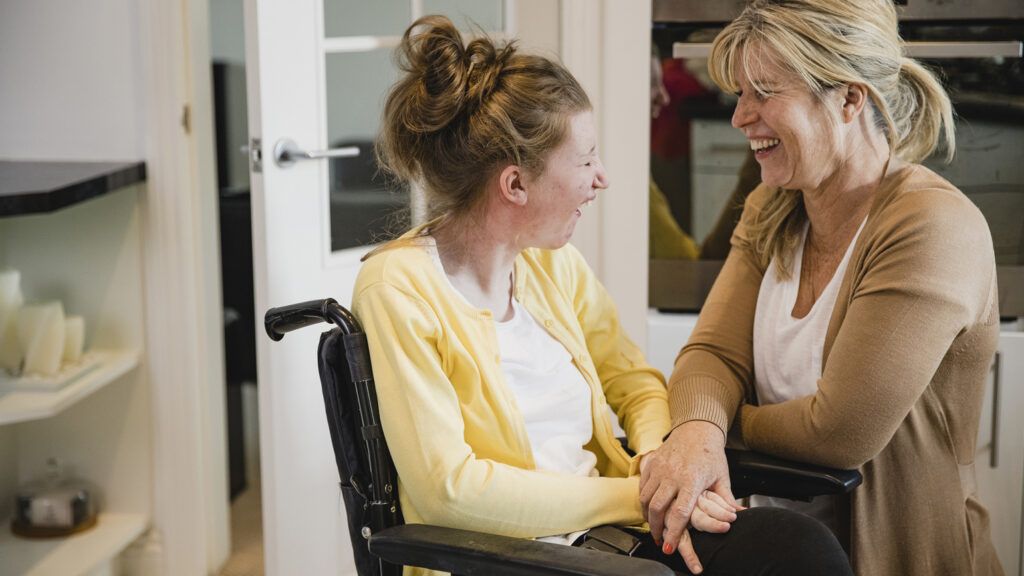Branka Primetica, MSW, is the BRI Care Consultation™ Program Manager. Lauri Scharf, LSW, MSHS, is a Care Consultant & Master Trainer at Benjamin Rose Institute on Aging
Parenthood can be one of the most fulfilling experiences in life. But regardless of circumstances, it is fraught with challenges. When a child has developmental disabilities, the particular challenges may extend far into his or her adult years. As the adult child ages, so do the parents, which brings a whole new set of concerns over how ongoing care will be handled. If you are an aging parent with these concerns, know that an abundance of resources are available to provide you with helpful options.
Your adult child’s disabilities may range from intellectual to cerebral palsy and autism to neurological impairments. These may delay or affect the normal physical, cognitive, learning, language or behavioral development process at an early age and may continue through adulthood (The Arc, 2011). Adult children who have any of these conditions may need help with:
• Day-to-day activities, such as bathing, dressing and eating
• More independent activities, including meal preparation and shopping
• Social interaction
• Safety issues that require general supervision
For parents, the constant planning necessary for giving this type of care can be mentally and physically stressful, leading to fatigue or exhaustion. This makes it all the more important to get the proper resources in place.
Concerns of Aging Parents As They Care for Adult Children
In nearly one million families, adults are being cared for by aging caregivers, and about two-thirds of these families have no future care plans in place (The Arc, 2011). Parents and their adult children may have aged together and supported one another, but each have their own growing health concerns and limitations. Aging parents face increasing concerns as to who will care for their child, where their child will live and what types of services will support their child.
Some are connected to the disability community, while others have been challenged by the lack of funding and long waiting lists for services. In fact, a survey conducted by The Arc, a national community-based organization which advocates for people with intellectual and developmental disabilities, found that the most common concerns for parents caring for adult children were related to:
• Lack of quality support
• Increased social isolation
• Having no one to help
• Institutional placement
• Health deterioration
• Abuse, neglect and financial exploitation
To compound the situation, as parents age along with their adult children, they face growing considerations of their own health, well-being and care situations. But there is hope.
Helpful Resources
If you are an aging parent caring for an adult child with developmental disabilities, the following options can help you to overcome the obstacles that you face:
• Reach out to your family and friends, no matter how small the task. Let them give you a break by preparing a meal, running an errand or driving to appointments or shopping destinations. Be open to accepting assistance when it’s offered, whether from your personal support network or professionals.
• Look into an adult day program if a change in living arrangements is not possible for now.
• Use assistive devices that give your loved one reminders, such as when to take prescriptions.
• Contact your local agencies to find support groups that will allow you to share stories, gather information together and bolster your emotional well-being.
• Be a vigilant advocate when seeking guidance from a variety of public and private agencies.
• Focus on building a network of connections and lifelines, bringing new contacts into your support team and establishing back-up plans, just in case a piece of the plan falls through. By moving forward one step at a time, a future care plan for both you and your loved one will be easier to put together.
County agencies focused on assisting adults and children with developmental disabilities, sometimes referred to as Boards, provide assessment, service planning and coordination services. In addition, they provide oversight and assistance to several providers in your area that may help with care for your adult children with developmental disabilities, such as by covering the cost of services to help them remain in your home, with a roommate or in another shared living residence.
The agencies assign a Service and Support Administrator to oversee services and help identify other community programs in which families may be eligible. To easily locate your state’s intellectual or developmental disabilities agency, visit the National Association of State Directors of Developmental Disabilities Services (NASDDDS) website. The listing provides names of state agencies to contact and seek further information for the county agency.
To find other local services and supports, you can visit The Arc. Programs vary by chapter and may include additional supportive services for homemaker and personal care, assistive technologies, advocacy and education. In addition, The Arc offers a Center for Future Planning that helps to support families with future care planning, decision-making, housing options and financial planning. The interactive website guides you through the process of learning about future planning, building a plan and finding resources, and it also allows you to see how others have developed their plans.
An additional resource is Easterseals, an organization that provides services for individuals with disabilities and special needs, including their families. The site has a locator to find your local agency. Programs vary by location and may include adult day services, home care, senior companion programs, therapy, vocational programming and community education.
For services that will help you as you age, visit the National Association for Area Agencies on Aging website. There are also local as well as national programs that can provide coaching to families and guidance in effectively managing current issues and future care planning. To explore the coaching services offered at Benjamin Rose Institute on Aging, visit BRI Care ConsultationTM.





